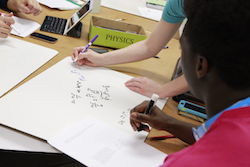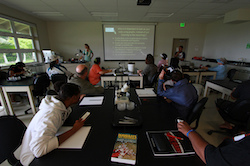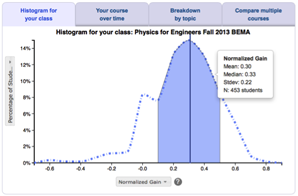Welcome to PhysPort, the go-to place for physics faculty to find resources based on physics education research (PER) to support your teaching. Learn more...
Teaching
I want to...Assessment
I want to...Troubleshooting
I need help with...Featured Expert Recommendations
Best practices for whiteboarding in the physics classroom
September 22, 2017 Whiteboards are an indispensable tool that physicists use to work out ideas individually and collaboratively, and to present those ideas, both for public discussion and critique of tentative ideas and for communication of more fully formed ideas. In this recommendation, we offer guidance for how to use whiteboarding effectively in your classroom.
Whiteboards are an indispensable tool that physicists use to work out ideas individually and collaboratively, and to present those ideas, both for public discussion and critique of tentative ideas and for communication of more fully formed ideas. In this recommendation, we offer guidance for how to use whiteboarding effectively in your classroom.
whiteboarding, best practices, SCALE-UP, Modeling Instruction
Where can I find good questions to use with clickers or Peer Instruction?
September 26, 2016 Many research-based teaching methods in physics, including Peer Instruction, CAE Think-Pair-Share, Technology Enhanced Formative Assessment, and teaching with clickers, involve having your students discuss and answer multiple-choice conceptual questions. A challenge of using these methods is finding and writing good questions. This recommendation helps you find and write questions for your class.
Many research-based teaching methods in physics, including Peer Instruction, CAE Think-Pair-Share, Technology Enhanced Formative Assessment, and teaching with clickers, involve having your students discuss and answer multiple-choice conceptual questions. A challenge of using these methods is finding and writing good questions. This recommendation helps you find and write questions for your class.
Peer Instruction, CAE Think-Pair-Share, Technology-Enhanced Formative Assessment, clickers
How can I talk about equity in physics classes?
February 6, 2021 This article describes an approach to introducing discussions about equity into the physics classroom, based on the Underrepresentation Curriculum (https://underrep.com).
This article describes an approach to introducing discussions about equity into the physics classroom, based on the Underrepresentation Curriculum (https://underrep.com).
equity, underrepresentation, curriculum
Latest news from PhysPort
Read the fall newsletter & join our mailing list
Find a physics education consultant: Directory of external evaluators, researchers, writers, editors, & more to help with your project.
Get a sneak preview of our new designs for PhysPort, coming in 2026.
Free open-source research-based curricula: PhysPort now hosts collections of curricula.
Use our Periscope collection of video lessons in your online LA/TA training class: Contact us for more details.
Curated collection of free wave and optics resources for your online class: Simulations & models, virtual labs, data analysis tools, and video collections.








